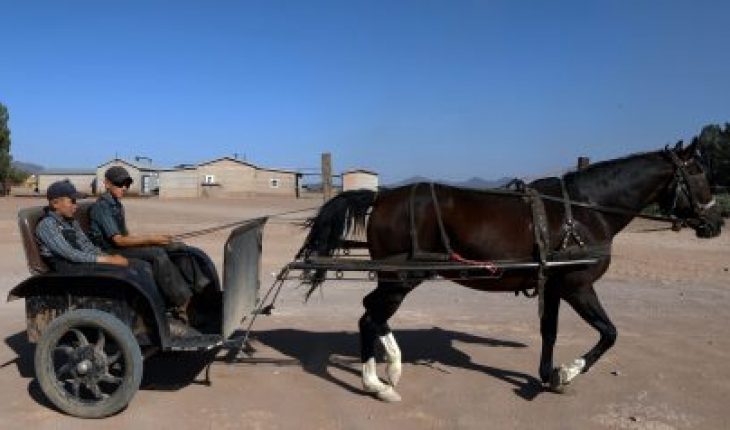The Mennonite community of El Sabinal, in northern Mexico, discovered that the world was being shaken by a pandemic because some young Mennonites have internet. Well, they don’t have a TV, electric light or cars.
In one of their sporadic connections in the Chihuahua desert they learned of the pandemic that plagued the world and may have reached them by the end of May, they count in the village.
“About ten, not very serious, sickened from different families. They thought it was the flu, but they went to the pharmacy and were told it was COVID-19,” a Mennonite shopkeeper told the AFP.
Read: Covid to increase poverty in Latin America by 37.3%; ECLAC forecasts biggest fall in GDP in 120 years
The sick did not seek medical or evidence, but they were isolated on the recommendation of the pharmacy manager, also a member of this ultraconservative community.
Contact with the outside of the Mennonites – deeply religious – is limited to visits to neighboring communities to sell their crops. Some believe that this way the virus could have reached them.
Yes to the rim
Since 2019, a hundred Mennonite families from El Sabinal – almost half – have migrated to Campeche by watching electric lays and cars break with their traditional lifestyle.
But young people like John and James have been left for lack of resources, making their way to other experiences.
“I’m not leaving, I don’t have the money to go and buy land in Campeche,” Juan Jhonson, 21, tells AFP.
Chihuahua, the gateway of the Mennonites who arrived in Mexico in the 1920s, has ceased to be lonely enough and now a part of the community faces Campeche, whose tropical climate contrasts with aridity and extreme temperatures of the north.
“I don’t want to leave either, I do want the tire, for them it’s wrong, (they think) the tire brings bad things, I think it helps us move,” adds Jhonson, a newlywed who works other family land.
Find out: Health adds to the record 471 deaths by COVID, with Mexico accumulating 82 thousand 348 deaths
It refers to the more traditionalists, who only accept the wooden wheels in their wagons, but did not object to the trailers to take their belongings to Valle Nuevo, as they baptized the community located about 3,000 kilometers from El Sabinal.
No to TV
The Mennonites are a branch of the Anabaptist Christian movement founded in the 16th century by pacifist Menno Simons, from whom they took his name.
Dedicated to agricultural and livestock work, they even manufacture their own clothes, just like for everyone.
“I’m going to stay here, I do want the tire (…). The light is difficult, it still doesn’t reach everyone. They’re turning on the light, but it’s going very slow and apart it fails a lot,” says Jacobo, 28, a father of three.
Little accustomed to dealing with strangers, those who agree to speak omit their first or last name.
Its language is German bass, a set of Germanic linguistic varieties, although males learn Spanish to trade their products.
“What do we want TELEVISION for? Television’s bad. But the tire, that is, because it helps us move fast,” argues a 20-year-old single man also named James.
He does so before starting the engine of his old van that will take him to Ascension, 59 kilometers above a tortuous terrace road, which in a wagon would take him a day.
With ingenuity, to facilitate their agricultural and commercial work, the younger ones have adapted new engines to old van casings.
Thanks to the facilities granted to them by the Mexican government, eager to populate the north of the country, thousands of Mennonites of German origin began arriving from Canada in 1922.
There are communities virtually all over the country, including Mexico City, in whose historic center it is common to see males, dressed in overalls, selling cheeses.
What we do at Animal Politics requires professional journalists, teamwork, dialogue with readers and something very important: independence. You can help us keep going. Be part of the team.
Subscribe to Animal Politics, receive benefits and support free journalism.#YoSoyAnimal
translated from Spanish: Mennonites discover pandemic because some young people have internet
October 7, 2020 |





